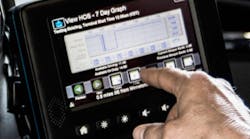Hours after a House committee passed a measure requiring additional study on the pending electronic logging device (ELD) mandate, a leading transportation attorney downplayed the chances of a major overhaul.
Included in a Department of Transportation fiscal 2018 funding bill passed July 17 by the House Appropriations Committee was language requiring a look at “whether a full or targeted delay in ELD implementation and enforcement would be appropriate.”
The mandate requires nearly all interstate truck drivers to begin using ELDs starting on Dec. 18 to monitor hours of service.
The bill, which next moves to the full U.S. House, calls the ELD mandate “one of the most expensive of all transportation rulemakings,” and one that could harm smaller carriers. It requires FMCSA to report back to the House and Senate within 60 days of the bill becoming law.
The House bill also calls for a review of ELD devices to confirm they meet standards and provide an easy-to-use interface.
The Federal Motor Carrier Safety Administration (FMCSA) wrote in an e-mail to Fleet Owner the mandate was ordered by Congress as part of the MAP-21 highway law and “requires only the most basic, lowest cost devices that still meet the statutory requirements.”
The agency did not address the details of House measure, but defended the years of work that went into developing the ELD mandate and said it will “work with Congress on the issues they identify to improve safety throughout the nation.”
Rob Moseley of Smith Moore Leatherwood
Rob Moseley, a partner with Smith Moore Leatherwood, was asked on July 18 about a possible delay or change to the mandate during a previously scheduled webinar on ELDs. He acknowledged he had not yet seen the exact language passed late the previous evening, but said, “I can’t see a complete overhaul of what is already in place.”
“There is general acceptance for ELDs,” he said. “You will see a very difficult fight for ELDs not to go into effect.”
Moseley noted the electronic logging mandate is not included in President Trump’s efforts to halt new regulations because it was already in process prior to his inauguration.
The ELD measure was praised by the Owner-Operator Independent Drivers Association.
“Clearly, members of Congress have heard concerns about the mandate from their constituents. The agency has failed to answer important questions from Congress and industry stakeholders about this mandate,” said Todd Spencer, OOIDA’s executive vice president.
Bill Sullivan, executive vice president of advocacy for American Trucking Associations, said the group was “disappointed” with this “misguided provision."
“This is a nakedly transparent effort by opponents of ELDs to chip away at a rule that will ensure compliance with hours-of-service and improve safety,” he said.
Similarly, the Trucking Alliance said in a statement ELDs will save lives and "there's no valid reason to delay this much needed truck safety measure."
Excluding the ELD language, the bill passed by the full committee mirrored what a subcommittee passed one week earlier.
It includes a provision blocking states from implementing their own meal and rest breaks for truckers, grants a one year delay for livestock and insect haulers from the ELD mandate, and eliminates funding for the Transportation Investment Generating Economic Recovery (TIGER) program.




